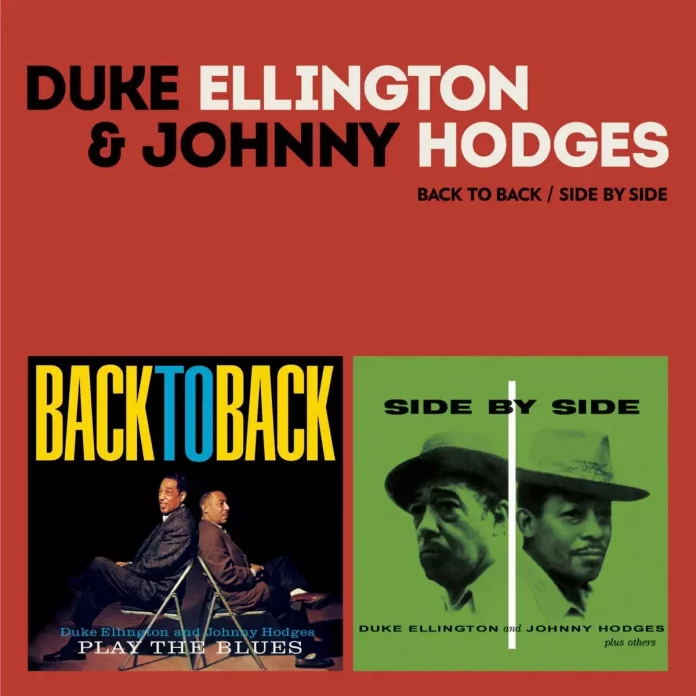So, two legendary albums (plus 15 extra tracks) by two legendary masters of pre-modern jazz who both influenced masters of modern jazz and have continued to do so until today.
Whilst I enjoy and admire Ellington’s big-band work I’ve always had a particular affection for his sessions with smaller units, not least on the albums he made with Coleman Hawkins and John Coltrane, where it is especially clear why and how he influenced modernist players as well as composers and bandleaders, including Thelonious Monk, Charles Mingus, Stan Tracey and Mike Westbrook. Incidentally, Coltrane had also, some years earlier, worked with Hodges, touring and recording with Rabbit’s band in 1954. In 1961 he described Hodges as “the world’s greatest saxophone player”.
I used to have the LPs of these albums (subsequently lost, probably in some home-move or through a loan that was never returned) but that was years ago, so I was able to come to these reissues with an almost virgin ear. I’d forgotten just how bluesy Back To Back was: it was actually subtitled “Play The Blues”. You wouldn’t expect these musicians to get really down and dirty but Hodges has no trouble sounding somewhat louche in the most urbane and elegant way.
Edison is on fine form, delivering a stream of well-constructed and engaging solos, and Duke is as aristocratic, arch, charming, relaxed and inventive as ever. Spann, Papa Jo and the bassists do all that is required and a bit more. Various other members of the Ellington community appear on the shorter bonus tracks, which are also good, with some atmospheric blues here too, and admirable work all round.
The repertoire on Side By Side is more varied, but it also includes some tasty blues-blowing. Eldridge contributes some striking work on the 1958 tracks: he manages to be incisive and laid-back at the same time. On those same numbers Strayhorn intriguingly substitutes for Duke, and there is highly pleasing work from Webster (of course).
The bonus tracks include some offcuts from the main sessions but are mostly from other occasions.
In their Penguin Guide To Jazz those other two legendary gentlemen, Richard Cook and Brian Morton (Morton happily still with us), gave both albums four stars, their top rating apart from the very rarely awarded coronet. I would not presume to disagree.
Discography
CD1: [Back To Back] (1) Wabash Blues; Basin Street Blues; Beale Street Blues; Weary Blues; Loveless Love; Royal Garden Blues; [bonus tracks] (2) Villes Ville Is The Place, Man; Brown Penny; Sentimental Lady (I Didn’t Know About You) (take 1); Smada; The Swinger’s Jump; The Swingers Get The Blues Too; Blues In Blueprint; Three J’s Blues; C Jam Blues (78.53)
CD2: [Side By Side] (3) Stompy Jones; Squeeze Me; Big Shoe; Going Up; Just A Memory; Let’s Fall In Love; Ruint; Bend One; You Need To Rock; [bonus tracks] (2) M.H.R.; Three And Six; Not So Dukish; Central Park Swing; Preacher Blues; The Last Time I Saw Paris (77.28)
(1) Harry “Sweets” Edison (t); Hodges (as); Les Spann (g); Ellington (p); Sam Jones or Al Hall (b); Jo Jones (d). NYC, 20 & 26 February 1959.
(2) Collectively: Ray Nance, Roy Eldridge (t); Lawrence Brown, Britt Woodman, Quentin Jackson, John Sanders, Booty Wood, Matthew Gee (tb); Hodges (as); Russell Procope (cl, as); Jimmy Hamilton (cl, ts); Paul Gonsalves, Ben Webster (ts); Harry Carney (bar, bcl); Ellington, Strayhorn (p); Jimmy Woode (b); Sam Woodyard, Jimmy Johnson (d). NYC, 25 February 1959, 2-3 December 1959, 10 September 1958.
(3) Collectively: Edison, Hodges, Spann, Ellington, Hall, Jones, Eldridge, Webster, Strayhorn, Brown, Jo Jones; Wendell Marshall (b). NYC, 1958.
Poll Winners Records PWR 27355
















